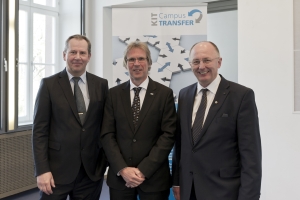KIT pursues the core tasks of research, higher education, and innovation. Innovation is aimed at making scientific findings usable for the market through spinoffs, patents and licenses, and services for industry.
“Transfer of technologies from research to industry decisively contributes to strengthening both Baden-Württemberg and Germany as a location of industry,” the President of KIT, Professor Holger Hanselka, says. “The KIT Campus Transfer GmbH acts at the interface between statutory tasks and entrepreneurial needs. By the flexible and effective structures it creates, KIT is enabled to rapidly execute service contracts from private enterprises and industry and to respond to industrial needs in a quick and tailor-made manner.”
Projects of high research and innovation depth funded by third parties shall remain part of the core activities of KIT. The newly established KCT will mainly focus on consulting and other services that are rendered by KIT and its scientists to industry and politics. Short-term and recurrent service and consulting contracts can be executed quickly. KIT is enabled to directly and immediately respond to needs, as a result of which cooperation with partners of industry and politics is strengthened. Examples are standard measurements for industry at test rigs for vehicles, for instance. Measurement instruments available at KIT for the development of new technologies are used for this purpose. Now, their utilization rate and profitability are increased.
KCT is to pool the independent activities of the KIT professors in a platform affiliated to the KIT. The professors are thus given the opportunity to use synergies. When executing their contracts, for instance, the management work may be done by KCT.
KCT focuses on the following business areas:
Innovation projects: Independent technology transfer units (TTU) under the roof of KCT provide a framework for the flexible execution of service projects. The TTU are headed by professors of KIT. The KCT legally represents the TTU, accomplishes the central financial and staff management tasks, and coordinates the interfaces to the KIT and to the partners and customers. “The advantages we offer include a flexible project management, the opening up of new markets, and faster implementation,” Dr. Hanns-Günther Mayer of the KIT Innovation Management Service Unit explains. He and Professor Albert Albers, Head of IPEK, the Institute of Product Engineering of KIT, are managing directors of KCT GmbH.
Spinoffs: Under the roof of KCT, spinoff projects of KIT, which produced first prototypes or products, can go on the market, validate their offers, and gather first experience in the early phase of their business already. The founders profit from the vicinity to the market and a professional administrative project execution. This option complements other offers of KIT made under the “KIT Founders Forge”, for instance.
Services: The complete portfolio of technologies and methods covered by the TTU is made available to interested companies in the form of a consulting service for own development work. It is also envisaged to establish a pool of consultants offering consulting services for spinoff projects.
The newly founded KCT already comprises fourteen technology transfer units for specific projects in the areas of mechanical engineering, electrical engineering and information technology, chemical and process engineering, civil engineering, geo- and environmental sciences, and chemistry and biosciences. The partners of KCT are the Förderverein für Innovation am KIT e.V. (Association for Supporting Innovation at KIT), the members being professors of KIT, the KIT itself, and the KIT Innovation gGmbH.
For further information, click: www.kit-campus-transfer.de
In close partnership with society, KIT develops solutions for urgent challenges – from climate change, energy transition and sustainable use of natural resources to artificial intelligence, sovereignty and an aging population. As The University in the Helmholtz Association, KIT unites scientific excellence from insight to application-driven research under one roof – and is thus in a unique position to drive this transformation. As a University of Excellence, KIT offers its more than 10,000 employees and 22,800 students outstanding opportunities to shape a sustainable and resilient future. KIT – Science for Impact.

